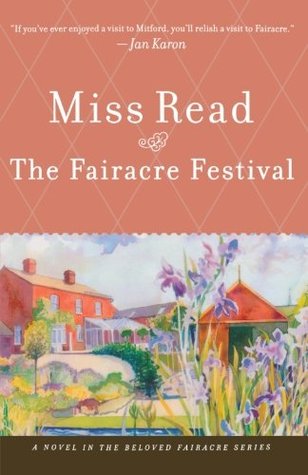Adventures in Bookland: Fairacre Festival by Miss Read

I don’t know how it is with you, but my wife and I have a running joke that one way of ensuring either of us never read a book is for the other to recommend it. We have very different reading tastes: my wife’s ideal, as she says herself, is a book where nothing much happens, there are no particularly high stakes, and everyone ends up reasonably happy ever after. The wife (Harriet) is the most voracious reader I know, probably reading over 200 books a year, whizzing through them at the rate of three or four a week! She reads to calm what is the most active, imaginative and empathic of minds, one that will engage so completely in the drama on the page that it’s for her own good that she avoids the grimmer reaches of modern fiction (although she is kind enough to read my stories in manuscript and, at times, when the mood is right, she will whizz through a whole shelf of classics).
Among her favourites has long been an author named ‘Miss Read’, a rather precious pseudonym it seemed to me, the pen name of one Dora Saint. Miss Read wrote tales of rural English life set in two villages, Fairacre and Thrush Green, where, as would be expected in any English villages outsider Midsomershire, nothing much happens. The Fairacre novels are written in partial first person by, in a metafiction device before anyone else had ever heard of metafiction, Miss Read herself: an unmarried teacher who is headmistress of the the one-form village school (it literally is one form, not one-form entry, with everyone above the infants taught in the same class by Miss Read). Harriet has read and reread every single one of the Miss Read books (the smaller set featuring Miss Read and the larger set written by ‘Miss Read’), returning to them in times of stress and difficulty to settle back into life at Fairacre. The stories are set in a slightly indeterminate time, both between the Wars and in the two or three decades after the end of the Second War.
There, you can tell how much and often Harriet had recommended the books to me by the amount I know about them without even reading one. But then, finally, barricaded in the small room to find some peace and solitude during this lockdown, I realised my only companion, and reason for staying longer in this grabbed-for chance for privacy, was a Miss Read book, Fairacre Festival, left on the floor by Harriet. So, I picked it up. I started reading it. And ended having the family check on me that I hadn’t died on the toilet!
It’s a delight. The story itself is light: a storm damages the roof of the parish church and the village rallies round to stage a festival to raise funds for its restoration. But the skill and dexterity of its telling revealed a master literary craftsman at work. The story is written in partial first person, with some chapters told from Miss Read’s (that is, the village headmistress) point of view and others in third person. The shifts between perspective are done effortlessly, without the reader realising any of the craft that went into smoothing out these transitions. The style itself, apparently so simple and unaffected, serves to put all the reader’s attention on the story and characters: it is the purest of storytelling and among the cleanest examples of prose writing I have read, comparable, if truth be told, to the literary cleanness and clarity of no less a writer than Evelyn Waugh.
The hardest thing of all is to write simple stories. Ornamentation serves to hide any underlying weaknesses, but strip this off and all that is left is story: people and plot. Miss Read (her real name was Dora Saint) wrote simple stories of ordinary people leading normal lives and infuses them with a particularity and place that makes them, effectively, timeless. A masterclass in writing. I will have to read some more of Harriet’s recommendations.
0 Comments